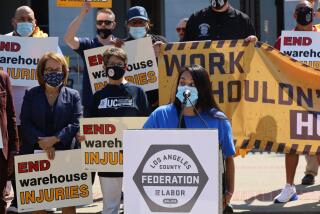Undue Influence Alleged in Energy Meetings
WASHINGTON â A top Energy Department official working on revision of power plant pollution standards met with 64 industry representatives and a single member of an environmental group, a Democratic congressman said Friday.
The lopsided numbers--seven meetings with business groups and one with one member of the Natural Resources Defense Council--suggest âundue industry influenceâ on the administrationâs deliberations, Rep. Henry Waxman wrote President Bush.
Dates of the meetings and the participants were detailed in a letter to Waxman from Frank Blake, the deputy energy secretary, who held the meetings. Waxman (D-Los Angeles) released Blakeâs letter.
Lobbyist and current Republican national chairman Marc Racicot was representing the Electric Reliability Coordinating Council, an industry group, at a July 23 meeting with Blake. There were 15 participants, including executives from Southern Co. and Duke Power.
The industry representatives at the meetings and the corporations they represent gave $6.4 million to Bushâs presidential campaign and other Republicans and $2 million to Democrats, Waxman said.
âThe notion that there is anything improper about an Energy Department official meeting with energy experts is absurd,â said Energy Department spokeswoman Jeanne Lopatto. âHe had eight meetings with energy experts, including an environmental group, and that was over a four-month period. Thatâs his job.â
The Bush administration is studying overhauling a regulation that requires power plants, as well as refineries and industrial sources, to install new pollution controls when they make significant improvements or expansions that result in additional chemical releases.
During the Clinton administration, the Environmental Protection Agency began aggressively to use those rules in enforcement actions against a dozen electric utilities, mainly those using older, much dirtier, coal-fired plants.
In a resignation letter last week, the EPAâs enforcement chief, Eric Schaeffer, said two companies that had tentatively agreed to settle lawsuits have refused to sign a final agreement, hoping that the rules will be weakened.
More to Read
Sign up for Essential California
The most important California stories and recommendations in your inbox every morning.
You may occasionally receive promotional content from the Los Angeles Times.










